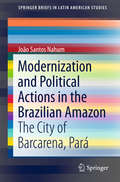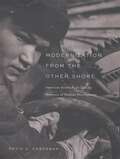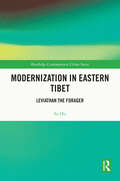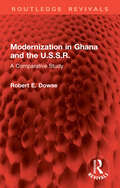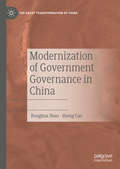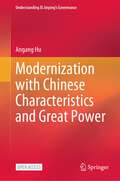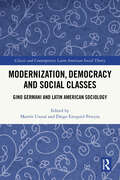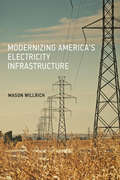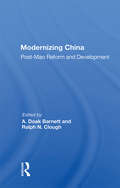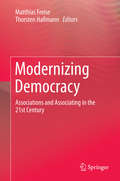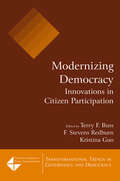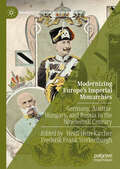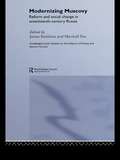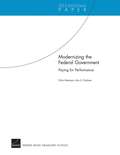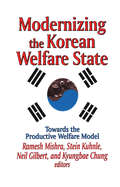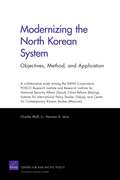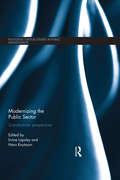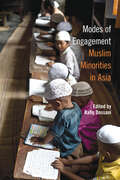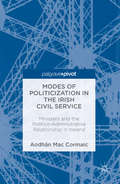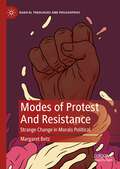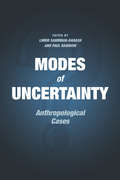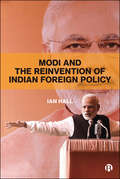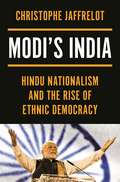- Table View
- List View
Modernization and Political Actions in the Brazilian Amazon: The City of Barcarena, Pará (SpringerBriefs in Latin American Studies)
by João Santos NahumThis book offers an analysis of the territory of Barcarena, in the Brazilian Amazon. The author studies the land use and the implemented modernization policies that made it one of the richest cities of the state. The political system uses this territory as a resource to provide for the needs of a small circle of social agents. A system of conservative political actions enforces the process of modernization of the Baracena territory. Innovations in the Barcarena territory, such as the implementation of the aluminium factory Albras/Alunorte and the territorial configuration or public administration, lead to modernization simulations and artificial devices. The intended effect however is more about appearing to be modern, than actual modernization. The territorial use of Barcarena is aimed to protect the interests and privileges of the elite.
Modernization from the Other Shore: American Intellectuals and the Romance of Russian Development (Emersion: Emergent Village Resources For Communities Of Faith Ser.)
by David C. EngermanFrom the late nineteenth century to the eve of World War II, America's experts on Russia watched as Russia and the Soviet Union embarked on a course of rapid industrialization. Captivated by the idea of modernization, diplomats, journalists, and scholars across the political spectrum rationalized the enormous human cost of this path to progress. In a fascinating examination of this crucial era, David Engerman underscores the key role economic development played in America's understanding of Russia and explores its profound effects on U.S. policy.American intellectuals from George Kennan to Samuel Harper to Calvin Hoover understood Russian events in terms of national character. Many of them used stereotypes of Russian passivity, backwardness, and fatalism to explain the need for--and the costs of--Soviet economic development. These costs included devastating famines that left millions starving while the government still exported grain.This book is a stellar example of the new international history that seamlessly blends cultural and intellectual currents with policymaking and foreign relations. It offers valuable insights into the role of cultural differences and the shaping of economic policy for developing nations even today.
Modernization in Eastern Tibet: Leviathan the Forager (ISSN)
by Su HuUsing ethnographic materials and documents from East Tibetan villages, this book addresses the impact of modernization on everyday life and the ways in which it melds with traditional forms of knowledge to create a new Tibetan identity and scientific rationality.Including cases centred on meteorology, geography, and seismology, the book assesses a wide range of traditional local activities, including foraging, farming, and domestic practices, and argues that and demonstrates how science, technology, and ideas about modernity have all influenced these activities. It highlights that when inconsistencies among different knowledges emerge, modernization can create inconsistent assemblages of modern and traditional practices and reveal the multiplicity of everyday life.Using these examples of everyday life to portray the complexity of day-to-day existence in Tibet, this book will be of huge interest to students and scholars of Tibet, China, human geography, anthropology, and the sociology of science and technology.
Modernization in Ghana and the U.S.S.R.: A Comparative Study (Routledge Revivals)
by Robert E. DowseFirst published in 1969, Modernization in Ghana and the U.S.S.R. examines the aspects of politics of modernization in two states—the U.S.S.R. and Ghana. One of the major contentions of the volume is that they faced a variety of similar problems and their responses to these had a great deal in common. The most obvious similarity between the two was the single-party state with a relatively high degree of control exercised by the party leadership over the party. There are also many similarities concerning attitudes to economic development and the outside world.The problem that most concerned the new leaders of Ghana and Russia was that of economic development. Political priorities were assessed in the light or by the standard of systems of ideas, of ideologies. The overall thesis of the book is that although Marxism-Leninism and Nkrumaism differ greatly, the leaders of the two countries in fact behaved in a remarkably similar fashion, and the author shows that their responses had as much to do with similar problems as with ideological patterns. This book is a must read for students and researchers of comparative politics.
Modernization of Government Governance in China (The Great Transformation of China)
by Ronghua Shen Sheng CaoThis book provides an all-round analysis and exploration of the course, status quo and future of the Chinese Government's governance reform under the framework of government governance modernization. The authors bring their decades of experience in crafting policy in China to explain the relationship between China's government and market, between government and society, between the central government and local governments, functional transformation, organizational structure optimization, reform of public institutions, allocation of fiscally supported personnel, the building of a law-based government and other major issues, while also laying out a case for structural changes in the years to come.
Modernization with Chinese Characteristics and Great Power (Understanding Xi Jinping’s Governance)
by Angang HuThis open access book expounds in detail on the profound meaning and main characteristics of modernization with Chinese characteristics. This was done utilizing tools of historical investigation and fact-based research on the modernization of New China. The author provides a far-reaching outlook of the strategic goals and future trends of modernization with Chinese characteristics. In this book, the author answers the questions: What is modernization with Chinese characteristics? How did this modernization develop, and what are its main features? In what direction will it develop in the future? Why did China propose to basically realize the goal of socialist modernization by 2035? How can China achieve this ambitious goal on schedule? What major impact will this modernization have on China and the world? This book adheres to the concept of "knowledge for the people, knowledge for the country, and knowledge for mankind." It actively explores and summarizes the laws of modernization with Chinese characteristics and fully elucidates its characteristics. This book not only provides decision-makers with a basis for understanding national conditions and their national policy research, but also serves as an important reference for party members, cadres, and readers to understand the path of modernization with Chinese characteristics.
Modernization, Cultural Change, and Democracy
by Ronald Inglehart Christian WelzelThis book demonstrates that people's basic values and beliefs are changing, in ways that affect their political, sexual, economic, and religious behaviour. These changes are roughly predictable: to a large extent, they can be interpreted on the basis of a revised version of modernisation theory presented here. Drawing on a massive body of evidence from societies containing 85 percent of the world's population, the authors demonstrate that modernisation is a process of human development, in which economic development gives rise to cultural changes that make individual autonomy, gender equality, and democracy increasingly likely. The authors present a model of social change that predicts how the value systems play a crucial role in the emergence and flourishing of democratic institutions - and that modernisation brings coherent cultural changes that are conducive to democratisation.
Modernization, Democracy and Social Classes: Gino Germani and Latin American Sociology (Classic and Contemporary Latin American Social Theory)
by Martín Unzué Diego Ezequiel PereyraGino Germani’s intellectual itinerary is a key step in the understanding of sociology in Latin America. Offering a fresh perspective, this book seeks to strengthen a better reflection on the history of sociology and social sciences in the region, through a reconstruction of the content and context of his enormous production and its legacies and legitimacies.The volume argues that Germani made a huge contribution to the development of sociology and social thought not only in Argentina and South America but also throughout Latin America, United States and Italy, with an enriching and original interdisciplinary perspective. It identifies his theoretical and conceptual proposals and empirical approach and discusses the implications of his ideas in different regional, national and local experiences and contexts. In particular, they promote the prospect of comparative studies focused on different areas of the Global South.A vital collection of work on a key thinker in Latin American Sociology for scholars and students of Sociology in the Americas and the Global South.
Modernizing America's Electricity Infrastructure (The\mit Press Ser.)
by Mason WillrichA comprehensive, coherent strategy for modernizing America's electricity infrastructure while ensuring affordable, reliable, secure, and environmentally sustainable electricity services.America's aging electricity infrastructure is deteriorating rapidly even as the need for highly reliable electric service—driven by the explosion of digital technology—continues to rise. Largely missing from national discussions, however, is a coherent, comprehensive national strategy for modernizing this critical infrastructure. Energy expert Mason Willrich presents just such a strategy in this book, connecting the dots across electric utilities, independent suppliers, government bureaucracies, political jurisdictions, and academic disciplines. He explains the need for a coherent approach, offers a framework for analyzing policy options, and proposes a step-by-step strategy for modernizing electrical infrastructure, end-to-end, in a way that ensures the delivery of affordable, reliable, secure, and environmentally sustainable electricity services.Willrich argues that an effective electrical infrastructure modernization strategy must incorporate flexibility, adaptability, and the capacity to coordinate policies at local, state, and federal levels. He reviews the history of America's electrification, from Edison's demonstration of the incandescent light bulb through the recent expansion of wind, solar, and energy efficiency as carbon-free energy resources. He describes the current ownership and operation of the electric industry and the complicated web of federal and state policies that govern it.
Modernizing China: Post-Mao Reform And Development
by A. Doak Barnett Ralph N. CloughSince the death of Mao, China has entered a new period in its development. Turning away from the all-encompassing emphasis on revolutionary struggle and ideological transformation that characterized the last years of the Maoist era, China's leaders under Deng Xiaoping have initiated dramatic new reform and development policies. In original essays, the contributors, all senior specialists on contemporary China, analyze the reasons for the new policies, the nature and impact of the changes now occurring, and the prospects for a continuation of these policies in the future. Specifically, they examine the Chinese polity as a "consultative authoritarian" system, the farreaching changes in China's agriculture, important shifts in foreign economic relations, the gradual modernization policy pursued by its military leaders, the relaxation of controls on cultural life, and the possibility that current social policies may well increase equality rather than inequality in Chinese society. The authors conclude that it is too early to judge the eventual, long-term outcome of current reforms, which they believe grew out of the political crises and chronic economic problems that afflicted China in the late 1960s and early 1970s. Although they see some opposition and built-in limits to reform, on balance they foresee strong support for continued reform and believe it will be difficult for future leaders to reverse course.
Modernizing Democracy
by Matthias Freise Thorsten HallmannModernizing Democracy brings together scholars focusing the role of associations and associating in contemporary societies. Organizations and associations have been identified as the "meso level of society" and as the "basic elements of democracy". They are important providers of welfare services and play an important role between the individual and political spheres. In recent years the environment of associations and associating has changed dramatically. Individualization, commercialization and globalization are challenging both democracy and the capability of associations to fulfill the functions attributed to them by social sciences. This change provides the central question of the volume: Is being part of an organization or association becoming an outdated model? And do associations still have the capacity of modernizing societies or are they just outdated remnants of post-democracy? The contributions to Modernizing Democracy will be organized into: Studying Association and Associating in the 21st Century, Associating in Times of Post-Democracy and Associations and the Challenge of Capitalist Development. The book will be attractive to third sector researchers as well as a broader academic community of political scientists, sociologists, economists, legal scientists and related disciplines.
Modernizing Democracy: Innovations in Citizen Participation (Transformational Trends In Governance And Democracy Ser.)
by Terry F. Buss F Stevens Redburn Kristina GuoHow do you put the "public" in public management? How can the traditional ethos of professionalism and technical expertise be reconciled with norms of representation and citizen participation at a time when technology is transforming communication between citizens and government - in some ways enhancing the exchange and in other ways complicating it? "Modernizing Democracy: Innovations in Citizen Participation" points the way. Written for public administration professionals, scholars, and students interested in citizen participation, it brings together new analyses of innovative practices, from hands-on community learning and focus groups to high-tech information systems and decision support technologies. The expert contributors illuminate the various roles that public administrators and leaders can play in fostering constructive, meaningful citizen involvement at all stages of the public policy process - from initiation and planning to feedback on public agency performance.
Modernizing Europe’s Imperial Monarchies: Germany, Austria-Hungary, and Russia in the Nineteenth Century (Palgrave Studies in Modern Monarchy)
by Heidi Hein-Kircher Frederik Frank SterkenburghUp until recently, Europe’s three imperial monarchies – the German, Austrian, and Russian Empires – were seen as moribund political entities, unable to accommodate the forces of political, social, economic, and cultural modernization, and as a result collapsed collectively during or shortly after the First World War. More recently, scholars have underlined the viability of these polities, including as frameworks for democratic experiments and fixed points for (supra)national identification, notwithstanding the suppression of minorities and colonial undertakings of these empires. This book takes a different approach: it demonstrates that these three imperial monarchies were capable of and willing to initiate and steer the modernization of their institutions and polities. Rather than understanding modernization as a linear and teleological process, this contributed volume draws instead on Samuel Eisenstadt’s notion of ‘multiple modernities’ to demonstrate how these empires sought to modernize on their own terms. By drawing on this concept, it becomes possible to challenge notions of inevitable decline and instead demonstrate how these imperial monarchies sought to forge modernization on their own terms in the nineteenth and early twentieth century.
Modernizing Muscovy: Reform and Social Change in Seventeenth-Century Russia (Routledge Studies in the History of Russia and Eastern Europe)
by Jarmo Kotilaine Marshall PoeFirst Published in 2004. Routledge is an imprint of Taylor & Francis, an informa company.
Modernizing the Federal Government
by Silvia Montoya John D. GrahamIn 2003, the Volcker Commission recommended that explicit pay-for-performance (PFP) systems be adopted more broadly throughout the federal government. In this occasional paper, the authors compare several proposals aimed at enhancing the role of such PFP schemes for federal civil servants, and examine the pros and cons of PFP schemes compared with seniority-based salary systems, as well as the proposals to change the General Schedule system.
Modernizing the Korean Welfare State: Towards the Productive Welfare Model
by Neil GilbertModernizing the Korean Welfare State analyzes recent developments in social and public policy in South Korea. Its focus is the new approach to Korea's system of social protection, known as the productive welfare paradigm. This volume brings together an international group of scholars to examine the new paradigm and associated policy developments. In the first part, contributors examine the significance of the productive welfare paradigm and recent policy developments within a broader comparative and international perspective. They question the commitment to welfare in the paradigm, viewing it largely as an example of a global trend towards the "enabling state" in which social welfare serves largely economic goals. Other contributors situate the new paradigm in relation to globalization and its implications for national strategies of social protection developed in earlier times. The new departure in Korea is compared to European welfare state development, and contributors find it a bold attempt to fashion a comprehensive welfare state based on social rights. In the second part, contributors focus on specific issues and policy areas. These include the degree to which Korea has been following a "pro-poor" growth policy. They evaluate developments in the area of unemployment and work injury insurance. They review the progress of policies in the area of social insurance and assistance, and the American system of income support for low income earners and its lessons for Korean policymakers. Other contributors review the public pensions system in Korea, and environmental protection policies are discussed and the impact of those policies on the poor and people of color, who are disproportionately exposed to environmental hazards.
Modernizing the North Korean System
by Norman D. Levin Charles Jr. WolfSix institutions in five countries that have key interests in North Korea's future undertook a collaborative effort to determine ways in which the North Korean system could move toward modernization. The effort produced illustrative plans, a consensus plan, and a tool kit for constructing alternative plans for stimulating the modernization of the North Korean system.
Modernizing the Public Sector: Scandinavian Perspectives (Routledge Critical Studies in Public Management)
by Irvine Lapsley Hans KnutssonAs policymakers and scholars evaluate possible ways forward in the reform and renewal of public services by governments caught up in a recessionary environment, this book aims to offer something different – a comprehensive analysis of the development of the ‘Scandinavian’ way of modernizing public-sector management. No book has yet provided an inside view of the development and character of New Public Management (NPM) in Scandinavia. Although there is a general perception that there is a clear-cut ‘Scandinavian’ model of public policy and management, this book offers a more nuanced interpretation, illuminating subtle distinctions in political, social and economic context which are significant in identifying receptive contexts for the adoption of modernization policies. Organized into three main themes in the modernization of the welfare state – management, governance and marketization – the contents revolve around unique empirical accounts, revealing distinctive Scandinavian characteristics of reform initiatives. The received wisdom may be a hesitant follower of the UK and the USA. But this book offers an alternative interpretation, revealing an edginess in certain Scandinavian settings, particularly in Sweden, which is a largely unrecognized. Without compromising the welfare state, it may be a bold frontrunner in the development of New Public Management.
Modes of Engagement: Muslim Minorities in Asia
by Rafiq DossaniOf Asia's 800 million Muslims, 215 million are minorities within their countries. These Muslim minorities have experienced a persistent decline in their socioeconomic and political status. Along with this decline, they are increasingly identified by their faith and largely accorded no other identity for civic relations. Why have these Muslim minorities been particularly affected during a time of unprecedented opportunities for the mainstream in Asia's unprecedented era of growth and rising freedoms? Using detailed analyses of China, India, and the Philippines, Modes of Engagement argues that key factors in this phenomenon include the linkage between socioeconomic decline, loss of political power, and narrowing of identity; nationalism and its associated connotations of the assimilation of minorities; the weakness of civil society generally in Asia; and the rise in regional and global alliances for security and trade. Contributors include Wajahat Habibullah (National Commission for Minorities and National Institute of Technology, India), Rakesh Basant (Indian Institute of Management), Dru C. Gladney (Pomona College), and Joseph Chinyong Liow (Nanyang Technological University's S. Rajaratnam School of International Studies, Singapore).
Modes of Politicization in the Irish Civil Service
by Aodhán Mac CormaicThis book presents a study of the relationship between Cabinet-level Ministers and top civil servants in Ireland. The nature of this relationship can potentially have far-reaching effects on people’s lives as it can influence the type of public policy agreed at top levels of government. A total of sixteen interviews were carried out for the research, eight with retired Cabinet-level Ministers and eight with retired Secretaries General of Irish government departments. Anonymity, not just for the participants but also for the government departments in which they had served, was vital to the success of the research. Also vital was the fact that only retirees were interviewed as this removed the fear for participants that their careers might suffer if they spoke too frankly. The result is a collection of interviews containing frank and open views on the relationship between Ministers and their officials and on how this relationship influences public policy development.
Modes of Protest And Resistance: Strange Change in Morals Political (Radical Theologies and Philosophies)
by Margaret BetzThis book presents a philosophical analysis of the different forms of political resistance and protest. It explores the normative space of resistance that is beyond self-defense and civil disobedience, and proposes the concept of “resistance violence” as a separate and special normative category. Instances that fall under this category can be, accordingly justified, even if they prove to be practically ineffective, by appealing to their role in preserving or upholding the dignity of the resistors or those who they aim to protect. Margaret Betz draws from important and interesting historical examples to establish the concept, and proposes to apply it to better understand contemporary struggles against injustice.
Modes of Uncertainty: Anthropological Cases
by Paul Rabinow Limor Samimian-Darah and Paul RabinowModes of Uncertainty offers groundbreaking ways of thinking about danger, risk, and uncertainty from an analytical and anthropological perspective. Our world, the contributors show, is increasingly populated by forms, practices, and events whose uncertainty cannot be reduced to risk—and thus it is vital to distinguish between the two. Drawing the lines between them, they argue that the study of uncertainty should not focus solely on the appearance of new risks and dangers—which no doubt abound—but also on how uncertainty itself should be defined, and what the implications might be for policy and government. Organizing contributions from various anthropological subfields—including economics, business, security, humanitarianism, health, and environment—Limor Samimian-Darash and Paul Rabinow offer new tools with which to consider uncertainty, its management, and the differing modes of subjectivity appropriate to it. Taking up policies and experiences as objects of research and analysis, the essays here seek a rigorous inquiry into a sound conceptualization of uncertainty in order to better confront contemporary problems. Ultimately, they open the way for a participatory anthropology that asks crucial questions about our contemporary state.
Modi and the Reinvention of Indian Foreign Policy
by Ian HallNarendra Modi’s energetic personal diplomacy and promise to make India a ‘leading power’, made soon after his landslide election victory in May 2014, surprised many analysts. Most had predicted that his government would concentrate on domestic issues, on the growth and development demanded by Indian voters, and that he lacked necessary experience in international relations. Instead, Modi’s time in office saw a concerted attempt to reinvent Indian foreign policy by replacing inherited understandings of its place in the world with one drawn largely from Hindu nationalist ideology. This book explores the drivers of this reinvention, arguing it arose from a combination of elite conviction and electoral calculation, and the impact it had on India’s international relations under Modi.
Modi's India: Hindu Nationalism and the Rise of Ethnic Democracy
by Christophe JaffrelotA riveting account of how a popularly elected leader has steered the world's largest democracy toward authoritarianism and intoleranceOver the past two decades, thanks to Narendra Modi, Hindu nationalism has been coupled with a form of national-populism that has ensured its success at the polls, first in Gujarat and then in India at large. Modi managed to seduce a substantial number of citizens by promising them development and polarizing the electorate along ethno-religious lines. Both facets of this national-populism found expression in a highly personalized political style as Modi related directly to the voters through all kinds of channels of communication in order to saturate the public space.Drawing on original interviews conducted across India, Christophe Jaffrelot shows how Modi's government has moved India toward a new form of democracy, an ethnic democracy that equates the majoritarian community with the nation and relegates Muslims and Christians to second-class citizens who are harassed by vigilante groups. He discusses how the promotion of Hindu nationalism has resulted in attacks against secularists, intellectuals, universities, and NGOs. Jaffrelot explains how the political system of India has acquired authoritarian features for other reasons, too. Eager to govern not only in New Delhi, but also in the states, the government has centralized power at the expense of federalism and undermined institutions that were part of the checks and balances, including India's Supreme Court.Modi's India is a sobering account of how a once-vibrant democracy can go wrong when a government backed by popular consent suppresses dissent while growing increasingly intolerant of ethnic and religious minorities.
Modus Vivendi Liberalism
by David MccabeA central task in contemporary political philosophy is to identify principles governing political life where citizens disagree deeply on important questions of value and, more generally, about the proper ends of life. The distinctively liberal response to this challenge insists that the state should as far as possible avoid relying on such contested issues in its basic structure and deliberations. David McCabe critically surveys influential defenses of the liberal solution and advocates modus vivendi liberalism as an alternative defense of the liberal state. Acknowledging that the modus vivendi approach does not provide the deep moral consensus that many liberals demand, he defends the liberal state as an acceptable compromise among citizens who will continue to see it as less than ideal. His book will interest a wide range of readers in political philosophy and political theory.
